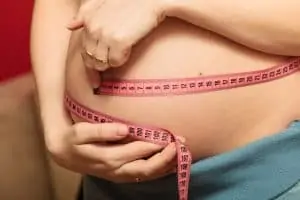Recently, my friend Olivia reached out to me. She’s been heavy most of her life but just got pregnant for the first time. Olivia, who was plus sized, is upset because people thought she was pregnant all the time. “Now they just assume I’m fat,” she lamented.
It’s a common problem with having belly fat before pregnancy. According to the CDC, an astounding 29% of women were obese before getting pregnant. Pre-existing belly fat in pregnancy is very common here. But what happens to pre-pregnancy belly fat? Does it just become part of the bump? Does it leave?
Today, I’ll be telling you more about early pregnancy belly fat plus what you can do about fat under the pregnant belly so that you can have the healthiest pregnancy possible!
What happens to the existing belly fat when pregnant?
If your belly is already fat, whether it’s your first child or you’ve had many more, you may want to know what to expect. Ultimately, your weight and what is healthy for you depend on several factors. I hope you will work with your doctor and listen to them about what is best for you and your baby.
So, where does that existing fat go anyway?
It gets stretched out evenly over where your baby is growing. If you are a bit overweight, it’s not much to worry about. But for mamas that are carrying a bit more, you should think about BMI and talk to your doctor about this.
The reason? You will naturally gain more weight as that baby grows. Part of it is from the baby, placenta, and all that. It’s not a wild card that allows you to keep eating like crazy.

If you gain too much weight in excess, your body’s fat stores can become a concern. Again, something to discuss with your doctor as you embark on your pregnancy journey. This way, you can be sure you and the baby stay healthy.
Will people be able to tell if I’m pregnant when I’m overweight?
Maybe. The thing is, I’m cut from the cloth of people who never want to assume. I never want to look at another woman and see what I think is a baby bump and congratulate her only to hear that she just miscarried and still looks pregnant or she’s just overweight and not at all pregnant.
Why? Because it has happened to me and just about every other woman, I know. It’s so upsetting for your well-being. That said, maybe no one will say anything to you about looking pregnant or looking overweight, and that’s probably a good thing.
Anyway, as I’ve mentioned in a recent post , most women will look pregnant around weeks 12 through 16. For anyone that falls into the overweight or obese category, this may mean it’s not noticeable at all, though.
How much weight should you gain during pregnancy?
Wondering what the sweet spot is for weight gain with your pregnancy? Much of it will depend on your BMI before discovering those 2 little lines on your pregnancy test.
Those with normal weight will have a BMI of 18.5 to 24.9 and should keep the weight gain during pregnancy (with one baby) between 25 and 35 pounds. In contrast, overweight women have a BMI of 25.0 to 29.9 and should aim only to gain 15 to 25 pounds, while those that are obese have a BMI of 30.0 or greater and should gain between 11 and 20 pounds.
These numbers will change if you’re carrying multiples, so it’s important to talk to your doctor about what’s best for you. The bottom line is that you should take steps to ensure you’re gaining the proper amount of weight for your situation.
Why those with early pregnancy belly fat should see their doctor
While every pregnant woman needs to work closely with her doctor, those that are overweight or obese should always stay on top of appointments. In general, those carrying more belly fat tend to have ovulation that is more erratic, which means it can be more difficult for your doctor to date the pregnancy.
Your doctor will measure your BMI and make recommendations accordingly. You’ll also be tested for gestational diabetes. It’s important to know if you have it or not so that your doctor can help you manage your health. If you test positive for gestational diabetes, you’ll have to watch your blood sugar levels throughout your pregnancy.
If you already had diabetes going into pregnancy, it’s even more important to take care of your health and follow your doctor’s direction for you and the baby.
How much of that gained weight is the baby?
Chances are, if you’re overweight and pregnant, you may be wondering just how much of that weight you’ll gain is distributed and where. From the BMI link above, you can see that every woman, even those that are overweight or obese, is expected to gain some weight during pregnancy. But how much of it is attributed to the baby?
Something to note down..
In healthy conditions for an average-sized woman, the baby will weigh about 7 to 7.5 pounds. Amniotic fluid is worth about 2 pounds of weight, while blood and bodily fluids each weigh 4 pounds. Expect breasts to weigh 2 pounds, placenta at 1.5 pounds, nutrients (protein, fat, and others) at 7 pounds, and the uterus at 2 pounds.
As you can see, if you’re overweight, you don’t have room to spare to gain weight. You’ll need to be cautious about how much you put on.
How to stay healthy during your overweight pregnancy
Your doctor isn’t going to recommend a diet right now, and attempting to lose weight while pregnant when you’re overweight or obese could be dangerous. Instead, it would help if you focused on being as healthy as possible.
Keeping weight gain to a minimum for those with plentiful belly fat can be tricky, but you should be able to make a plan with your doctor. These tips can help you keep up good health during this time.
- Prenatal vitamins
Take them! Your doctor will likely recommend one that will give you plenty of calcium and folic acid to help you and your baby stay healthy.
- Rest up
You’ll be running yourself ragged soon enough when this baby comes. Try now to get the sleep your body needs.
- Let go of stress
It’s likely you’re stressed out now because you’ve got excess weight and a baby on the way. Though I must urge you to let that go and focus on maintaining healthy habits of releasing stress. Exercise, massage, soothing music, a good book, or time with a friend can surely help.
- Provide the best nutrition
Yes, you need to eat, but let go of that “eating for two” mentality. You were overeating already if you’re going into this pregnancy overweight or obese. That doesn’t mean you need to starve or torture yourself either.
I’m not saying you shouldn’t enjoy a treat here and there when those cravings strike but DO make the majority of what you eat nutritious and beneficial for you and the baby. Every bite of food you chew and swallow provides direct nutrition to your baby. Make that food count, and remember that you will need to consume about 350 to 450 calories per day depending on the trimester you’re in and what your doctor says.
- Drink that water

Because water has thermogenic properties that boost your metabolism and keep your appetite balanced, it’s something you should rely on heavily while pregnant. Carrying water with you everywhere will help you remember to keep drinking it and keep yourself healthy through this pregnancy.
In addition to helping keep your weight gain at the proper levels during pregnancy, water prevents preterm contractions and other problems. When you go pee, take note of the color of your urine. If it’s dark yellow, that’s no good and means you’ve got to up that water intake.
- Choose foods that are filling
Let’s hop back to foods for a minute here. Because I can tell you, you may feel starving while pregnant. Certain foods can be better choices because they will make you feel satiated and keep you feeling fuller for longer. Those foods have fiber, protein, and plenty of water naturally in them.
But is Chinese food safe to consume during pregnancy? Here’s the answer.
Try snacking on walnuts instead of chips. Choose whole grains for your carbs. Add a side of leafy green veggies to every meal. Use beans as protein instead of fatty meats. You get the idea!
- Get that exercise

Make sure your doctor says it’s safe for you to do physical activity. Most women will be encouraged to do so with a small amount of you being put on bed rest due to complications. For those that have been told to be active, even if you’ve never exercised before pregnancy, you should get into it.
No, that doesn’t mean you’ve got to go to the gym from sun-up to sundown. It simply means that you should prime your body for birthing your baby. Labor is very intense and exhausting for the body. I remember being completely wiped out before I finally had that emergency c-section.
Simply starting with daily walks is a wonderful way to keep active during your pregnancy. Your doctor will likely let you know what activities are safe. It’s encouraged that you do so because regular exercise during pregnancy can prevent excess weight gain to keep things healthy.
Additionally, getting up and moving around can keep you from developing gestational diabetes and blood clots, plus it can ease pregnancy-related back pains. The muscles you work even just by walking get you ready for the main event and make it easier to get your body back in shape after giving birth.
- Try keeping a food journal
One last thing I want to recommend, which has helped my friend Olivia, is keeping a food journal. For her, she couldn’t ever figure out why she was gaining so much weight. Once she started detailing what she was eating and how much, she discovered she was consuming too many calories.
Sometimes, these calories were from good foods too. So yes, while it helps to use olive oil when cooking, do remember that measuring it to the proper levels (a tablespoon is about 120 calories) can keep a dish that’s supposed to be healthy as a healthy one.
Final thoughts on belly fat when pregnant…
If you’re trying to get pregnant and haven’t had success yet, try working on getting your body in good health first. It may help you get that pregnancy, and when it does, you’ll be better poised for a healthier outcome. You’ll also have an easier time getting back to shape.
And if you’re already pregnant but overweight or obese, work with your doctor. Once you’ve gotten to the postpartum period, you can work on losing weight. Do it for your health and for that baby. Believe me, even if you’re carrying a little bit extra, you’re making your heart work harder. Be there for that baby as long as you can by getting your health on track!
Leslie Berry lives with her husband and two young daughters in Los Altos, California, where she loves helping other moms get comfortable with motherhood and embracing the insanity with facts peppered with laughs.
She loves eating too much sushi, exercising, and jamming out on her Fender. Read more about Leslie here.







